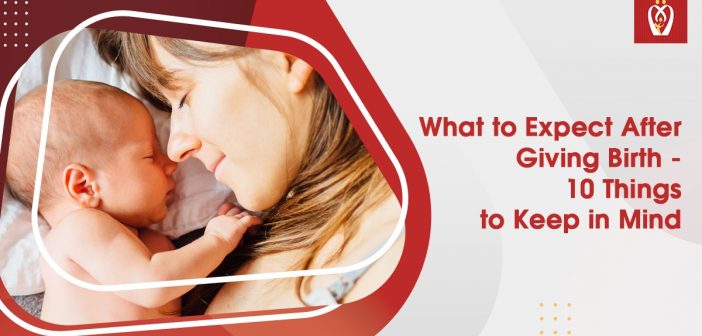The 40 (or so) weeks of pregnancy and long hours of childbirth are behind you, and you’re officially a mom. Congrats!
After the pregnancy comes the transition to postpartum, which brings with it a range of new symptoms and questions.
During pregnancy and childbirth, your body undergoes significant changes. After your kid is delivered, these changes continue. Your post-baby body isn’t the same as it was before you got pregnant. It will take some time to recover and adjust. Remember that the changes in your post-baby will improve over time, and you will be able to reclaim the majority of your pre-pregnancy figure. It’s critical to understand what to expect from your post-baby body and not to dismiss its changes.
While many women plan for labour and delivery, they are often unprepared for their bodies’ changes after birth. According to one study, women’s body dissatisfaction rose throughout the postpartum period compared to the late stages of pregnancy. So, expect to see changes after you deliver your baby, and know that they’re a normal part of the childbirth process.
The First Days: What to Expect from your post-baby body
Vaginal discomfort and agony
You’ll probably have vaginal soreness and tenderness for the first few days, but this will subside. However, if you had an episiotomy, a tear, or needed stitches, the discomfort could be even worse. If your discomfort gets worse over time, it could be an indication of an infection, and you should see a doctor. Following are some suggestions for reducing vaginal pain after childbirth
- Use a bottle to squeeze water over the delicate area when you need to urinate. This reduces the stinging sensation caused by urine on the perineum.
- To ease pressure on any aching places, use pillows and cushions.
- Bathe in a mixture of baking soda, herbs, and salt in a shallow tub. A sitz bath is a term used to describe this mixture. It’s available at a pharmacy. Experiment with different temperatures until you find the most relaxing one for you.
Pain and discomfort from a C-section
It’s critical to rest as much as possible after a C-section to allow your post-baby body to heal. Your doctor may recommend a pain reliever. Try side-lying or football as nursing positions that don’t put the infant directly over the incision site. Contact your doctor if you detect any discharge or swelling around your incision site, as this could indicate an infection.
Bleeding and discharge
Expect a copious red discharge during the first several days following labour. This should lighten and turn into a mucousy, watery discharge that can last weeks. Consult your doctor if your bleeding worsens if you fill more than one pad per hour.
Painful Contractions
As your post-baby body compresses uterine blood vessels and your uterus returns to its pre-pregnancy shape, you may experience uterine contractions that feel like menstruation cramps. Ask your doctor if you can use over-the-counter pain medicine if you need to.
Breasts
As your milk production increases, expect engorgement, or swelling, in your breasts during the first few days following labour. Breastfeeding often helps to minimise edema during this period. Other things to try for comfort are
- Between feedings, place cold clothes on the breasts.
- To make latching easier, release a small bit of milk before feeding.
- Before feeding, take a warm shower to make milk removal simpler.
The First Weeks: What to Expect Postpartum
Changes in attitude
It’s common to have mood swings after giving birth to a baby. For example, you may find yourself sobbing more frequently than usual, feeling more anxious, and having mood swings. These changes should subside after a few weeks, but if they don’t, see your doctor since you could be suffering from postpartum depression.
Changes in bowel motions and incontinence
During pregnancy, your pelvic floor undergoes some modifications, and it may take some time to regain strength. After childbirth, some women experience partial incontinence for several months or longer. Sneezing or coughing aggravates the situation. To enhance bladder control, try completing Kegels or pelvic floor exercises.
If you’re having trouble passing stools, try increasing your fibre intake and asking your doctor if a stool softener is recommended.
The First Months: What to Expect from Your Post-Baby Body
Changes in hair and skin
For the first few months after childbirth, you may find that your hair sheds more frequently. This isn’t cause for alarm; it’s simply your post-baby body’s method of getting rid of the extra hair you acquired during pregnancy due to hormones. Stretch marks may appear bright at first on your body after pregnancy, but they will diminish over time, even if they do not totally disappear.
Weight fluctuations
Even months after labour, the weight of your body after pregnancy may not recover to where it was before pregnancy. According to one study, nine months postpartum weight remained 5.4 pounds higher than pre-pregnancy weight.
We at Nurturey understand how overwhelming post-pregnancy can be. However, you are not alone in this journey. Nurturey is here to assist you throughout your journey. Nurturey’s Pinkbook tools will ensure that you and your little one have the best start in life and keep you healthy throughout the pregnancy. To learn more, visit nurturey.com







